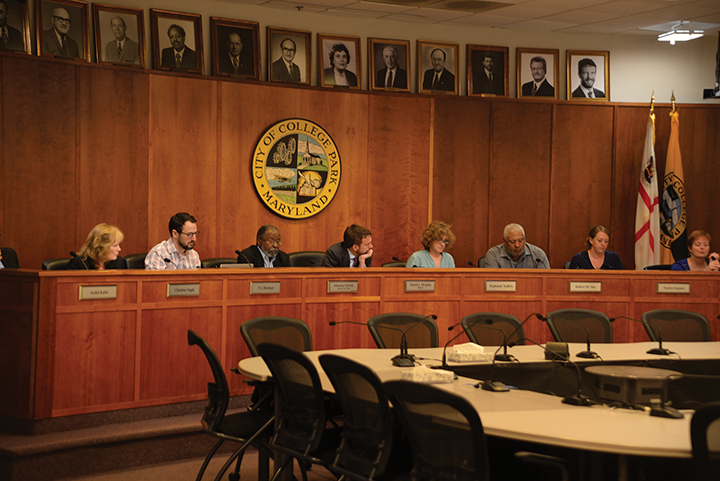After nearly two years of negotiations, the College Park City Council voted early Wednesday to submit an offer to purchase College Park Woods Swim Club to acquire more meeting space.
The city will have until Sept. 20 to submit a purchase offer to the swim club’s board of directors.
College Park has an interest in purchasing the property because it is still used as a public meeting space, District 4 Councilwoman Mary Cook said, adding that with less meeting space in the Old Parish House and Davis Hall, they are in high demand.
Scott Somers, the city manager, said College Park Woods is relatively isolated and there aren’t many other closed meeting spaces in the area.
The swim club property includes a clubhouse where neighbors regularly gather if there is an issue, District 4 resident Joseline Peña-Melnyk said.
“There has been controversy over whether or not the city should purchase the property, if it’s actually worth saving or should it just go to a developer,” said Steven Mudd, an attorney for the swim club.
The city reported the cost of acquiring and improving the property will be between $500,000 and $750,000, according to a regular council meeting agenda item.
“To have meeting space in your own neighborhood is a real asset,” Somers said. “That’s an asset that the council and the residents really want to make sure was preserved going forward.”
[Read more: The city of College Park will run the Downtown Food Truck Hub]
The pool, which was built in 1962 when College Park Woods was first developed, has seen declining membership, and the board has been struggling to be maintain it in recent years.
Mudd said the pool “was in desperate need of repairs” last year, noting “30 or 40 health code violations.” The county did not renew the swim club’s pool license permit that year, which meant it could no longer operate as a pool.
“It was not in a condition for people to be swimming in,” Mudd said.
The city plans to demolish the pool, which will cost around $330,000, Somers said.
“There’s many residents and council members that feel the city has to step in to make sure that particular property doesn’t continue to degrade, because it’s a neighborhood quality of life issue,” Somers said.
Cook said the more than 650 households in the area surrounding the property “have paid huge amounts of money in taxes over the years,” but don’t have as many amenities as other neighborhoods.
After the three interested parties submit a purchase offer, the pool board will decide which to sell the property to, Mudd said.
Negotiations between the city and pool board have taken almost two years because there is uncertainty about who owns the property, Cook said.
[Read more: City officials want College Park to host Amazon’s new headquarters]
There is a record gap of whom the owners were because the board has changed hands so many times, Mudd said.
This means even if the pool board decided the city should be the property buyer, the council is uncertain the pool board has the authority to transfer the property.
Mudd has filed a petition that would allow the property to be sold by giving the authority to accept the purchase offer to the courts. The pool board would notify the court of whom they recommend to buy the property, and a court-appointed trustee would sign a deed transferring the property to that buyer, who would then have full ownership of it.
“This is something that can be very positive for College Park, particularly for west College Park,” Cook said. “I really hope that we end up being the purchasers of that pool property and that we can shape it into an amenity that we can be proud of as a city and as a neighborhood.”



